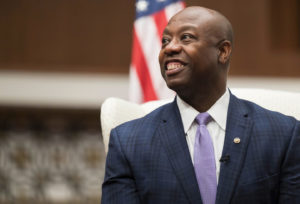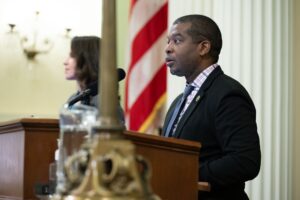Progressives in California weaken child sex trafficking bill before advancing it
A bill introduced in the California state Senate that would toughen penalties for sex trafficking children was watered down after activists representing LGBT and minority interests complained it was…

A bill introduced in the California state Senate that would toughen penalties for sex trafficking children was watered down after activists representing LGBT and minority interests complained it was unfair.
Progressive witnesses claimed the penalties would “disproportionately impact marginalized communities, particularly Black and brown individuals,” reported The National Desk.
But supporters of the bill said the complaints and testimony by progressive witnesses did make sense, and they actually make an argument for more restrictive measures, not less.
“I’m not sure what exactly it is that would make the black, brown and LGBTQ communities more at risk for increased penalties for child sex trafficking,” noted Sherman Frederick, who previously served as publisher for the Las Vegas Review-Journal after a four-year stint as its editor.
Frederick said he thought sexual preferences and race have nothing to do with stopping child sex trafficking. Or at least ought not to have anything to do with the issue.
“I’m just challenging the argument that sexual orientation and skin color somehow come into the discussion. It doesn’t. Stop it,” he added.
The measure, Senate Bill 1414 passed out of committee by an 8-0 vote, but only after the bill was watered down to remove trafficking protections for 16 and 17-year-olds.
Under current law in California, anyone convicted of solicitation for sex with a minor “is guilty of disorderly conduct, a misdemeanor,” said the legislative digest.
The intent of SB 1414 was to upgrade the punishment, by making “the act of soliciting or engaging in any act of commercial sex with a minor a felony” for any perpetrator over 18, said the bill.
But the amended version changes the language to define the victims as “under 16 years of age.”
“It should not be so complicated to protect ALL children from being purchased for sex, yet some Democrat legislators think 16- and 17-year-olds should not have the same protections given to 15-year-olds,” said a statement by the bill’s main sponsor, Sen. Shannon Grove, R-Bakersfield.
To be sure, the bill also has plenty of bi-partisan support.
As originally authored, Grove was joined by Sen. Anna Caballero, D-Merced and Sen. Susan Rubio, D-Baldwin Park.
Conservative critics said that the opponents of the bill are just reinforcing the stereotype that liberals are interested in sexually “grooming” kids.
“Now, listen to these oral arguments in the California Assembly and tell me they’re not an advertisement for outlawing the Alphabet cult altogether,” asked NotTheBee, posting the testimony in front of the California Senate’s Public Safety committee on X.
The committee testimony also included comments by April Grayson, who spent 17 years in prison after being convicted in 2000 of kidnapping, false imprisonment, procuring for purposes of prostitution, firearm enhancements and bringing an explosive into jail.
The case involved trafficking of an 19-year old and a 14-year old female runaway, who was picked up on a highway.
Grayson showed a gun to one of the victims and said, “a hoe tries to run away from her pimp, then they kill her or put her in the hospital, either one; but they do something pretty bad to her,” according to an appeals summary.
“Grayson showed [the victim] the bullets in the chamber and described them as ‘the kind that ricochet through your body,’” said the court.
The appeals court upheld the convictions, only modifying the sentencing for Grayson.
But that’s not how Grayson described the convictions to the state Senate committee.
Grayson described herself as a victim of trafficking, “a survivor who has been criminalized and demonized by the legal system that was meant to protect me.”
She said the bill would “actively harm any survivors of human trafficking, especially the black, brown, native, poor, LGTBQ and trans survivors, who are already least likely to see justice.”
In her testimony, Grayson mentioned only “pimping and pandering” charges and neglected to mention the convictions on the weapons, kidnapping and other charges that resulted in a lengthy prison sentence.
Grayson blamed the crimes on her co-defendant, according to her Senate testimony, but never raised the issue on appeal, according to court records.
“Defendant Grayson’s sentence reflects a principal term of 15 years, consisting of the midterm of five years for kidnapping, plus an additional 10 years for the related firearm enhancement … Consecutive terms were added for the following offenses and their associated enhancements: two years eight months for pandering, two years for pimping, and one year for the explosives charge,” said the appeals court.
A study involving the world’s largest index of trafficking victims shows that human sex trafficking often involves other violent crimes, as demonstrated by the Grayson case.



